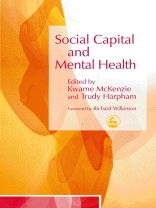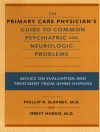`The effects of social context and social structure on health are well documented. The concept of social capital provides a slightly different take on the issue, as it attempts to discover the features of populations in different areas that are crucial in determining the extent and the quality of social interactions and the social institutions within society. Such factors as social networks, levels of participation in civil life (as a citizen) and levels of trust within communities are all associated with social capital.
This book provides a detailed exploration of the concept, on its effects on psychological functioning and on the risk factors for mental health that are associated with communities that have either high or low levels of social capital.’ – Community Care
Why do some areas have a higher prevalence of mental illness than others? How does the structure of a society affect its inhabitants’ mental health? This remarkable book is the first to explore in detail the concept of social capital and its implications for mental health policy.
Drawing on evidence from international research and fieldwork, the contributors examine the risk factors for mental health associated with both low and high social capital communities. They discuss the importance of relationships between individuals, groups and abstract bodies such as the state and outline different systems of social capital, for example intra-group `bonding’ and inter-group `bridging’. The authors challenge the notion of community as a strictly area-based concept and call for broader-based studies of communities built around race, faith or even around a common social exclusion. Social Capital and Mental Health also reviews methods of measuring social capital, analyses the implications of research findings for future policy developments and makes clear recommendations for future practice and research.
This book will be an informative and engaging read for sociologists and psychiatrists, and an incisive resource for policy makers and practitioners.
Jadual kandungan
Foreword, Richard Wilkinson. Part 1: Theory and methods. 1. Meaning and uses of social capital in the mental health field, Kwame Mc Kenzie and Trudy Harpham. 2. Social risk, mental health and social capital, Kwame Mc Kenzie. 3. Systematic review of the methods used in studies of social capital and mental health, Mary de Silva. Part 2: International studies. 4. Ethnographic investigation of social capital and mental health in Gospel Oak, London, UK, Rob Whitley. 5. Social capital and quality of life and mental health in Maastricht, the Netherlands: The neighbourhood matters, Marjan Drukker, Charles Kaplan and Jim van Os. 6. Social capital and mental health in the urban south, USA: A quantitative study, Carey Usher. 7. Social capital and mental health of women living in informal settlements in Durban, South Africa, and Lusaka, Zambia, Liz Thomas. 8. Social capital and youth mental health in Cali, Columbia, Trudy Harpham, Emma Grant and Simon Snoxell. Part 3: Conclusion. 9. The state of the art, Kwame Mc Kenzie. Index.
Mengenai Pengarang
Trudy Harpham is Professor of Urban Development and Policy at London South Bank University and Honorary Professor at the London School of Hygeine and Tropical Medicine. Her research focuses on urban health in developing countries, including an international study of childhood poverty in Peru, Ethiopia, Vietnam and India.












